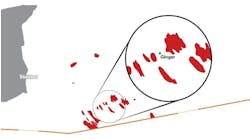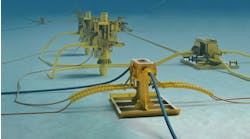Bruce Beaubouef
HOUSTON – Low oil prices have increased pressure on the oil and gas industry to improve the capital efficiency of major projects, and examine the supply chain that is vital to their successful execution.
That was the message offered byHarry Brekelmans, Projects & Technology Director, Royal Dutch Shell plc, in a presentation entitled “Forging a world leading supply chain” offered on Wednesday at this year’s Offshore Technology Conference in Houston.
He observed that capital intensity within the oil and gas industry is too high, and that “risk and inefficiency have spread unchecked.”
In addition, both labor and engineering intensity were too high. “The automobile industry has better labor productivity than the oil and gas industry,” Brekelmans said. “We need to strip out waste.”
He noted that the industry needs to start with project scope, and has to fight “scope creep.” The industry needs to re-examine its capex and design on major projects. He noted that projects must be “kept competitive.” While all segments of the industry have a role to play in this effort, he conceded that it “needs to start with operators.”
The industry also needs to take advantage of existing standards, which do not necessarily have to come from the oil and gas space. He noted a recent example where Shell was able to save $50 million in shipyard expenses by using existing metrics.
At the same time, he contended that the oil and gas industry needed to set new standards, and referenced Shell’s participation in a new joint industry project that is working tostandardize subsea processing systems.
With regard to safety, he emphasized the industry’s need for “no harm, no leaks, and no waste.” The crucial question, he noted, is how industry can increase the efficiency of the supply chain while maintaining safety.
He also emphasized the need for efficient execution at the workplace. “We need to look at how man-hours are spent,” Brekelmans said. Better training and coaching can lead to reduced man-hours, and thus lower costs. He also said that the industry could improve efficiency by eliminating unneeded requirements – “there are too many requirements to keep track of” and a “mountain range of paperwork,” he observed.
More efficient execution in cyberspace is an important part of this, he noted. Improvements here could lead to better tracking of tools and equipment, and greater use of cyber systems could also help improve construction management.
Brekelmans noted that Shell is using some of these systems for itsPrelude FLNG project,and added that the company believes it can save 10 to 15% through the implementation and use of such tools.
It would also be helpful if more vendor and OEM catalogues were made available online. “Search tools would be especially helpful,” he said.
The industry also needs to make greater use of “off-the-shelf” technology, Brekelmans observed. He cited the example of the use of a Veros Systems monitoring program Shell had recently deployed, which allows operators to better plan their maintenance programs.
He also noted that Shell has been asking suppliers about the products and systems that other operators are using on their projects. This is another example of Shell’s efforts to improve supply chain efficiency.
Brekelmans also underscored the importance of “co-innovative technology,” wherein operators and vendors work together to develop the products and systems the industry needs. He noted that Shell had recently worked with vendors and suppliers to develop swellable packers and swellable dope pipe, an effort that enabled Shell to save 50% in the cost of tubing on one project.
There needs to be “candid collaboration” within the oil and gas industry, he commented. The “arm wrestling” that too often characterizes operator-vendor-supplier relationships needs to change to hand-shaking. “We need to fundamentally change behavior,” he said.
“The industry supply chain is reaching a breaking point due to the downturn,” he noted. People are leaving the industry, and capital is drying up. Better and greater transparency is needed, along with the implementation of performance incentives and better performance indicators. “Talking about things openly is a big first step,” Brekelmans commented, “and leaders need to set examples.”
The primary key steps to improving the industry’s capital efficiency, he concluded, are: competitive scoping, efficient execution, affordable technology, and transformation of the supply chain.
Brekelmans said that Shell has been doing its part to drive this transformation. “If we as industry leaders don’t oversee this and drive this, it won’t happen,” he said.
05/05/2016


